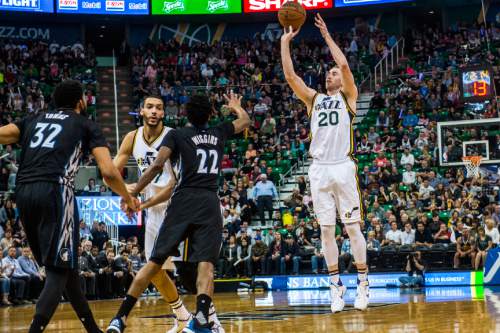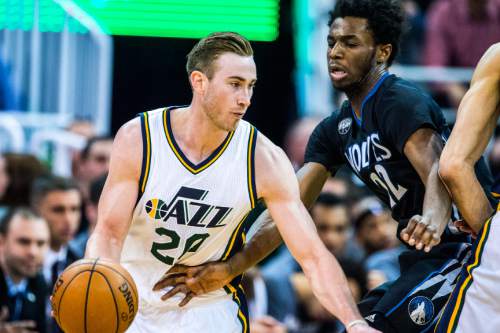This is an archived article that was published on sltrib.com in 2016, and information in the article may be outdated. It is provided only for personal research purposes and may not be reprinted.
Monday night's national championship game was another chance to relive all of college basketball's shining moments. And, invariably, Gordon Hayward knows someone this time of year will ask him about his shot.
The half-court heave at the buzzer of the 2010 title game follows him to this day. But if Hayward is most remembered for a game he lost, it is only because of what came before that put him in that spot: win after win after win. From a high school championship, to the run to the NCAA title game at Butler, Hayward's early days were marked by victories. So as losses piled up in the NBA, the young Jazzman took them harder than most.
And all of that would make a playoff breakthrough this season that much sweeter for the Jazz's leader.
"Gordon's a really competitive guy and he's used to winning," Jazz coach Quin Snyder said. "I think that's something that's been consistent throughout his career. It's important to him, there's no question about it. You've seen that. He's been an ironman."
Hayward brushes off questions about his ailing foot, which caused him to miss two games last month and still nags him now. He knows how much his team needs him with just five games remaining and the Jazz back in the playoff hunt, desperate to make the postseason for the first time since 2012.
"It's really exciting," Hayward said. "Each game means so much. This is what you play the game for to have a stretch like this."
When the Jazz jumped headfirst into a rebuild in the summer of 2013, Hayward was given the reins and a chance to be the team's No. 1 option whether he was ready or not. Hayward, who has seen his scoring average increase in each of his six NBA seasons, jumped from 14 points a game in 2012-13 to more than 16 the next year and more than 19 the year after that. But along the way, the Jazz amassed 101 losses over those two seasons.
"It definitely makes a long season when you have a lot of losses and you're rebuilding," Hayward said. "But I think you could see the talent that we had and see where we were going. That's what you had to focus on."
Not that it was always easy to do.
Last season the Jazz closed strong but had started so poorly the playoffs were never really within reach. Meanwhile, his friend and former teammate Shelvin Mack was part of a deep playoff run in Atlanta. His former coach, Brad Stevens, and teammate, Ronald Nored, cracked the postseason with the Celtics, too.
"It's tough especially coming from a winning program like Butler, where you're used to winning all the time and then things don't go your way. It's tough mentally," Mack, now the Jazz's starting point guard, said. "He complained a little bit. That was kind of tough on him."
This season, Hayward has a chance to take that next step: leading a team into the postseason. And he's done just about everything in his power to set the Jazz up to make that leap. On Sunday, the ever steady Hayward scored 22 points — his 40th game of at least 20 points this season-to go along with five rebounds and five assists, as the Jazz cruised to a win in Phoenix and stayed in control of their playoff destiny.
Suns coach Earl Watson had to be impressed. Watson played with Hayward for a time in Utah and helped mentor him. But Watson, who spent a season with the Pacers during his journeyman career, was in Indiana in 2010, watching closely that season as the scrawny kid from Butler led his Bulldogs to win after win. And the coach knows how much it would mean to Hayward to lead the Jazz to this one.
"You see the process and evolution of his career," Watson said. "This is everything he's ever dreamed of. He puts everything he has into leading the program of the Utah Jazz."
Twitter: @tribjazz —
Spurs at Jazz
P Tuesday, 7 p.m.
TV • ROOT Sports









